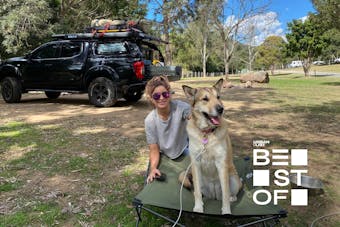Trending
35 Of The Best Restaurants In Brisbane Right Now
These Brisbane restaurants are the must-dos, the have-to-tries, the places you would tell visiting friends to dine at, and the bucket-list special treats to book when you want to splash out.
30 Of The Best Things To Do In Brisbane
Here are 50 of the absolute best things to do in Brisbane, whether you’re a local or not.
50 Of The Best Cafes In Brisbane That You Should Have Eaten At By Now
Whether you dig on granola or the greasy fry-up, these are 50 of the best Brisbane cafes (in no particular order) you can depend on—consider it your 2025 to-do list.
The Latest
Heading To Noosa? Add These Stunning Spots To Your Stay And Play Lists
With a forecast of crisp sunny days and good times on the agenda, there’s endless places to play and stay in this literal slice of paradise.
Starry Nights And Superyachts: 7 Reasons You Need To Head To Hamilton Island Race Week
You don't have to be a sailing fanatic to head to Hamilton Island Race Week.
The Best Things To Do In Brisbane This Weekend
Here are the best things to do in Brisbane this weekend.
SUUM
The CBD’s upcoming Korean omakase restaurant blends traditional and contemporary cuisine in an intimate 16-seat experience.
Sal’s Authentic New York Pizza
This iconic New York-style pizza chain with a legendary recipe is finally touching down in Brisbane.
Sunnyside Sliced
Newstead's latest pizza joint is slinging homely and hearty pies made to grab and go on your merry way.
Here’s How To Win $2K For You And Your Pups Next Adventure Together
Discover your dog's travel style, plus a few travel tips and score $2K towards your next vacay together.
Buckle Up And Plan Your Next Trip With This New Pooch-Friendly Travel Platform
Sure, vacays are great—but let's be real, they’re SO much better with our four-legged friends in tow.
Sleep In, Sip On With 27 Of The Best Bottomless Brunches In Brisbane
Get a mimosa in one hand and a fork in the other at the bottomless brunches worth waking up late for.
Yiayia’s Pantry
Get your hands on the ingredients and flavours integral to any Greek kitchen at this new delicatessen.
Hotel HQ
Underwood’s go-to local has hit refresh with a new alfresco dining area and dedicated kids' zones.
Milano Bakehouse by Merlo
Queensland-born coffee empire Merlo unveils a new artisan bakehouse in Bowen Hills.
Alsahwa Estate
Set across 30 acres, check out this stunning farm-to-plate experience in a new Mediterranean-inspired restaurant.
The Feed | All The Brisbane Food News You Need To Know
It’s almost impossible to keep up to date on all of Brisbane's foodie news, so to make it easy, we've rounded up all the updates you need to know.
47 Of The Best Movies On Netflix Australia To Stream Tonight (July 2025)
Stay updated with the best movies and documentaries on Netflix Australia this summer. Your ultimate streaming guide is here.
A Complete Guide To Brisbane’s Best Markets
From weekend produce markets to late night artisan pop-ups, here are all the best Brisbane markets that are worth visiting.
Chargrill Charlie’s
The home of award-winning chargrilled chicken and fresh salads is finally making its Brisbane debut.
Winnifred’s
Arthur’s Street’s new Champagne bar and bistro is bound to be the bubbliest spot in town.
Birdees
Brisbane’s most iconic late-night rendezvous is reopening after a multi-million dollar makeover.
Coming Soon: Queen Amann Bakery
King Street’s new bakery specialises in flaky and buttery kouign-amann.
From Sips To Sights, These Are The Best Spots To Catch Riverfire In 2025
Fire up that group chat and get planning because Riverfire is returning to Brisbane with a bang in 2025.
30 Of The Best Restaurants In Adelaide Worth Checking Out (July 2025 Edition)
Adelaide—and all of South Australia alike—have skyrocketed their way to some of the country's hottest culinary merits thanks to their stunner local produce, homegrown talent and some gutsy big openings.
22 Romantic Getaways In Victoria That Are Swoonworthy
Planning the perfect romantic escape can be tough when life is hectic. So Urban List has done the hard work for you, searching high and low to bring you 22 of the best romantic getaways in Victoria.
Mansfield Tavern
An iconic southside pub enters a new era with entertainment at its core.
Tellus Bar & Dining
The Barracks’ new Latin-inspired spot is inspired by the elemental trio of grape, grain and dough.
Central Restaurant
The team behind Southside have opened a subterranean dumpling restaurant in the CBD.
Clarence Restaurant
One of Brisbane’s most beloved dining rooms is making a bold move to Fish Lane.
Turn The Page With 16 Of Brisbane’s Best Independent Bookshops
Read widely and read deeply by scouring the shelves at Brisbane's best independent and secondhand bookstores.
Multicultural Feasts And Street Eats: These Are The Must-Try Global Bites In Logan
We've rounded up the best global bites to hunt down next time you find yourself in Logan.
The Best Hotels In Singapore Worth Booking In 2025
Looking for where to stay in Singapore? From luxe stays to budget-friendly gems, here’s our ultimate guide to the best hotels in Singapore for 2025.
Olivera
The bayside has scored a new home for refined coastal dining in this elegant Mediterranean restaurant.
Sushi Room
Simon Gloftis' fine dining Japanese spot is expanding with an elegant bar and new alfresco dining space.
Adela Wine Bar
Settle into Albion’s European-inspired haven that spotlights small-batch, terroir-focused wines.
25 Brisbane Date Ideas That Aren’t Dinner And A Movie
If you really want to win over your love, it’s time to step up your date game with these date ideas in Brisbane.
Op Shops And Goosebump-Inducing Shows: Our Brisbane Editor’s Fresh Guide To A Girls’ Night Out
If you’ve been hitting the group chat with "we should catch up!" but haven't gotten around to making plans yet, consider this your sign to finally lock something in.
How Roberta Pecoraro Turns Mid-Week Chaos Into Heartfelt Moments On A Plate
We all know the five love languages—but for model and home cook Roberta Pecoraro, there’s one missing: cooking.
Layla
Bold and moody, Shane Delia's first Queensland restaurant packs a spice-filled punch.
Commercial Hotel Boonah
The century-old Commercial Hotel Boonah has been lovingly restored, reopening with an on-site craft brewery—Boonah Brewing Co.
Dakabin Hotel
From the arcade to the sunken fireplace, the highly anticipated Dakabin Hotel is opening this week.
Lord Stanley Hotel
East Brisbane’s iconic pub has reopened after a $15 million transformation.
12 Of The Best Dog-Friendly Camping Spots Around Brisbane
No need to find a puppy sitter, we've rounded up the most dog-friendly camping spots around Brisbane, where you and your pooch can tent up together.
It’s Official, The Lorde Ultrasound Tour Is Coming To Australia And New Zealand In 2026
Kiwi pop icon Lorde has finally dropped dates for the Australian and New Zealand leg of her tour.
From French Flicks To Jazz Soirees, Here’s Where To Celebrate Bastille Day In Brisbane
Vive la Brisbane and channel your inner Francophile at Brisbane's best Bastille Day celebrations.
Coming Soon: Power Moves Newstead
Redefining boutique fitness, Power Moves is more than just a Pilates studio.
The Summit Restaurant
This multi-million-dollar revitalisation pairs iconic views with Queensland flavours.
Oxford 152
Oxford Street’s one-and-only pub has unveiled its $1.72 million transformation.
5 Cocktails And Snacks In Brisbane You Need To Try
Some nights, we go all out: entree, main, sides, dessert. Other times, all we want to do is meet up with our mates over a plate of nibbles and call it dinner. Here's your chance.
13 Of The Best Airlie Beach Airbnbs For Whitsundays Fun
Based at the doorstep of the Great Barrier Reef, with a vibrant nightlife and heaps of restaurants and cafes, Airlie Beach is the bomb. Now you just need the best Airbnb to match.
Hit The Road, Here Are The Best Things To Do In Tamborine Mountain
Round up the crew, get the playlist sorted, and pick a designated driver because these are best things to do in Tamborine Mountain.
Wild Legs Wine Room
Newstead’s new wine room is putting indigenous and unheard grape varietals in the spotlight.
Pippa’s Pantry
Camp Hill’s new all vegan bakery is pretty, pink, and full of pastries.
10 Of The Best Port Douglas Airbnbs For Tropical Vibin’ In 2025
With so much to explore in Port Douglas you want to be planning a lengthy and comfortable stay—and we’ve got you covered with the best Airbnbs.
Soak It Up At 16 Of Brisbane’s Best Bathhouses With Spas And Saunas
Don't sweat the small stuff with a blissful soak and steam session at these spots.
New Farm’s Beloved Joedy’s Cafe Is Evolving Into A Cosy Wine Bar After Dark
Joedy’s is entering its next era with a new name, new look, and all the reasons you already love.
Puck
Puck is Newstead’s new dog-friendly bar and cafe for seasonal tapas and wine by the riverwalk.
Hai Hai Ramen West End
Cult-fave Hai Hai Ramen has opened a second location in West End.
Marble Korean Steakhouse
Korean BBQ meets a modern steakhouse in Portside Wharf’s new elegant spot, Marble Korean Steakhouse.
Krabby’s Crab Boil
Pouring up Louisiana-style seafood boils, Krabby’s Crab Boil has officially arrived in Brisbane.
8 Of The Best Restaurants On Hamilton Island
Hamilton Island—the holiday place of the nation’s rich and famous and if you're lucky, you and yours. we’ve done the legwork and scoped out the best restaurants Hamilton Island has to offer, so get that online booking forefinger ready.
11 Of The Best Places To Stay On Hamilton Island In 2025
Explore the best Hamilton Island accommodation options, from luxury resorts to family-friendly stays and secluded villas. Whether you're after a romantic escape, family holiday, or relaxing retreat, our guide will help you find the perfect Hamilton Island resort for your dream getaway.
Views And Value: 5 Restaurants You Need To Visit In Brisbane
These are the Brissy restaurants that don’t just deliver on taste, but are a feast for the eyes.
The Beach Hotel Stradbroke Island
Big things are happening on Stradbroke Island—the legendary Beach Hotel is getting a serious glow-up.
TAMA Supper Club
TAMA, the iconic fine-dining institution in the Fortitude Valley, has rebranded.
Coming Soon: TABOO
Massaman curry and cocktails on a rooftop? We’re intrigued—and that’s what’s coming to the Valley soon with the arrival of TABOO.
D.Vino Bistro & Vinoteca
Tucked away in Woolloongabba is where you’ll find D.Vino Bistro & Vinoteca, an uber romantic dining spot from the owner of Ashgrove’s Arcade Wine.









































































.png?auto=format,compress&w=340&fit=crop&ar=3:2)
.png?auto=format,compress&w=340&fit=crop&ar=3:2)

